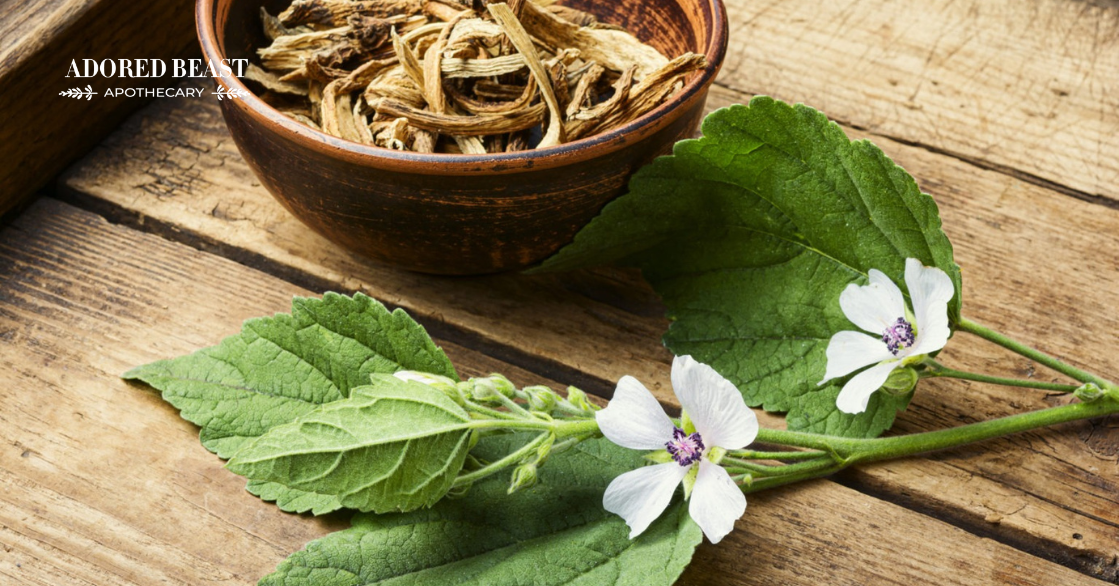Herbs are a fantastic way to add nutrition and other health benefits to your horse’s diet. Some herbs are considered nutritive, others have more medicinal benefits, and some are both. Today’s spotlight is on a very special medicinal herb: marshmallow root.
Marshmallow Root for Horses
Marshmallow root (Althaea officinalis) is known as a demulcent. That means that it soothes irritation of mucous membranes. It is widely recognized for this purpose in horses. Studies show that it is effective for:
- gastric inflammation (1)
- coughs and respiratory inflammation (2)
- repair of mucosal membranes (3)
- antimicrobial (pathogens) (4)
- anti-inflammatory (4)
- immunomodulatory (4)
Healing with Marshmallow Root
We have all known or had a horse that has suffered from gastric disease – eg. ulcers and colic. The inside of the gastric system is one giant mucosal membrane. It is the largest mucosal membrane in the entire body. The thing is, when it becomes inflamed and damaged, it becomes highly dysfunctional. Not only do the cells become damaged through erosion of the mucosal layer that sits on top of them, but the microbiome that inhabits the mucosa also gets destroyed. Science is showing us that the microbiome is a key communication system between the inner and outer environments of the body and a fundamental part of immune function. When this system becomes disturbed, it can lead to any number of health conditions including, but not limited to:
- immune-mediated disease (auto-immune diseases and low immune function)
- metabolic disease
- gastric disease
- neurological disease
- internal organ diseases
Marshmallow root can help to keep the vital endothelial cells, the mucosa, and the microbiome of the gastric system intact and healthy, lending a huge influence on overall cellular health and regulation.
[RELATED] To learn more about the dysfunction that can occur in the presence of a disease gastric system, and solutions for it, read my blog on leaky gut in horses.
How Marshmallow Root Protects Your Horse
Mucous production is impaired when the epithelium is damaged and inflammation can occur if the cells are exposed and eroded by stomach acid and other materials coming into the digestive tract. Essentially, this is a how ulcers form.
As previously mentioned, marshmallow root is a demulcent, meaning that it contains high levels of mucilage. This is a sticky, viscous fibre that absorbs liquids in the digestive tract. It also adheres to the digestive tract, forming a protective layer over inflamed epithelium, much like mucous would do if it was being produced by healthy gut cells.
Marshmallow root can also provide prebiotic fibre to promote healthy bacterial growth in the small intestine and the cecum. This can be useful for horses that suffer from chronic dry manure or have a history of impaction colic. It can also be useful for balancing the microbiome in horses with chronic diarrhea (fecal water syndrome).
How to Use Marshmallow Root
When selecting a marshmallow root source, be sure that it is either wild-crafted and/or certified organic. There are many forms including dried whole herb, dried whole herb powder, and extract. Be sure that you know which one you are using as each one will have a different dosage for your horse.
- Dried whole herb: start with 1/3 cup daily and you may double that amount over a few weeks if all is well at 1/3 cup.
- Dried herb powder: 25-50 grams per day.
- Extract (4:1 ratio): 300-600 grams daily – you may double this amount if you are seeing some positive effect but the issue isn’t completely resolved.
Herbs should be given rotationally for 6-8 weeks with a break and evaluation at this time as to how often your horse might need this herb. If you’re not sure how to assess how your horse is doing on the herb, consult a professional equine nutritionist or holistic equine veterinarian.
Marshmallow root for horses is one of several options that can easily be added to the diet without breaking the bank. Plant-based foods are a species-appropriate way to increase the nutrient profile of your horse’s diet while simultaneously protecting the gut.
References
- Antioxidants (Basel): Gastro-Protectivve and Anti-oxidant Potential of Althaea officinalis and Solanum nigrum on Pyloric Ligation/Indomethacin-Induced Ulceration in Rats, 2019
- Frontiers in Phamarcology: Anti-inflammatory and Anti-oxidative Effects of Phytohustil® and Root Extract of Althaea officinalis L. on Macrophages in vitro, 2020
- Journal of Ethnopharmacology: Aqueous extracts and polysaccharides from Marshmallow roots (Althea officinalis L.): Cellular internalisation and stimulation of cell physiology of the human epithelial cells in vitro, 2010
- International Journal of PharmTech Research: The OPharmaceutical importants of Althaea officinalis and Althaea rosea: A review, 2013












